The company producing natural honey and mead without additives is working to standardize beekeeping and to introduce a modernization plan
Launched in 2017, the beekeeping farm Les Villages Apicoles Horizons S.A (ViAHSA) is trying to modernize the honey industry in the North-East, despite various losses as a result of rudimentary practices.
In its early days, the company transformed honey into wine.

Range of honey wines: OrGin (for men), Lune de Miel (for women) and Roselle (for the elderly). ©ViAHSA
Its honey production, estimated at more than 200,000 liters per year, came primarily from beekeepers in the region.
However, the company began to encounter its first difficulties when it accidentally sourced low-grade honey from the North East. This honey was intended for exporters in the United States, France, and Canada.
Read also: Biochar: an ecological innovation in the South of Haiti
“When we processed it to obtain the mead, it was not in good condition and we lost the stock,” says Ascencio Paul, executive director of ViAHSA.
Following the experience with the bad honey, exporters no longer showed interest in the company’s production which did not meet the requirements of the international market.
Honey is a smooth liquid with tiny crystals, produced by bees from the nectar of flowers that helps fight certain infections by stimulating a person’s immune system.
100 grams of this product can deliver 300 kilocalories to the human body.
It is also used in cooking as a natural sweetener and in cosmetics to make beauty products.
Following the experience with the bad honey, exporters no longer showed interest in the company’s production which did not meet the requirements of the international market.
In Haiti, the customary exploitation of honey by local beekeepers remains informal and affects the quality of the product.
In addition to the impurities it contains, traces of carbon monoxide and fecal matter are also observed, which is a challenge in terms of marketing on the international level.
Since ViAHSA did not yet have the capacity to develop large beekeeping farms at the time, officials established a protocol for controlling the quality of honey upon purchase, including the refractometry, colorimetry, odor, flavor, and acidity of the honey coming from its suppliers.
This has enabled the company to market another product: Miel du Roi (King’s Honey), which aims to offer consumers quality gourmet honey.
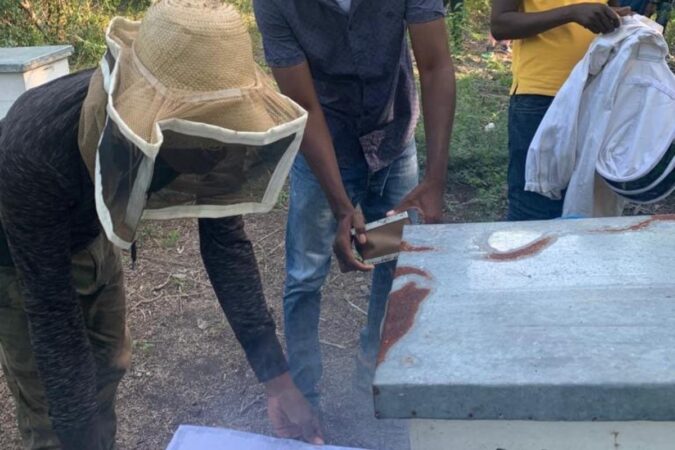
Workshop on modern beekeeping techniques at ViAHSA’s Center for Continuing Education in Apiculture (CFPA). ©ViAHSA
However, challenges persist despite these initiatives.
This is due to the company’s heavy dependence on beekeepers in the region. The launch of their first product, “Miel du Roi”, did not solve this problem.
A second bad experience struck the company in 2019.
That year, a French association committed to fair trade practices and active in the Grande-Anse region planned to order 13,000 pounds of honey per month. But it refused to finalize a contract after tests carried out on honey samples in France revealed an excess of carbon monoxide in the product.
With this contract, the company could expect an annual income of $1.2 million.
100 grams of this product can deliver 300 kilocalories to the human body.
The presence of carbon monoxide in honey is due to the fact that “beekeepers usually harvest honey with a lot of smoke,” specifies apiculture promoter Ascencio Paul.
Produced by the incomplete combustion of materials such as wood or gas, carbon monoxide presents a health hazard if inhaled.
This is a problem that affects nearly three quarters of the honey produced in Haiti, he estimates.
“We lost quite a few contracts, but we learned from these experiences,” assures Paul.
Poor quality honey already cost the company another contract in 2017.
Read also: Insecurity and Dominican competition are stifling poultry production in Haiti
This first contract was worth US$32,000 for 5,000 bottles of wine that year, with orders expected to increase gradually.
But, the company accidentally sourced poor quality honey, which ultimately led to the termination of the contract.
Following these missed opportunities, the company producing natural honey and mead without additives endeavored to standardize beekeeping and work on a modernization plan.
Initiated in 2020, this plan aims to create a modern sector for the production, collection, processing, packaging, and marketing of honey in the North and the North-East with informal beekeeping operations and the collaboration of other partners.
Honey is a smooth liquid with tiny crystals that helps fight certain infections by stimulating a person’s immune system.
The objective is to increase the regional production of honey and its derivatives: mead, honeycomb, pollen, propolis, wax, royal jelly, soap, etc.
A binational study conducted in 2018 by an NGO called the Oxford Committee for Relief Famine (OXFAM), allowed the company to assess the sector’s main constraints including: rudimentary beekeeping practices, a lack of standardization in harvesting, and problems linked to the processing of honey.
The study carried out on beekeeping in Ouanaminthe and in the border region has enabled ViAHSA to become an integrated enterprise covering all aspects of beekeeping, explains its manager.
The company markets the Miel du Roi, the result of a collaboration with beekeepers trained within the company, and Christophia honey, produced on its own farms in compliance with honey production standards.
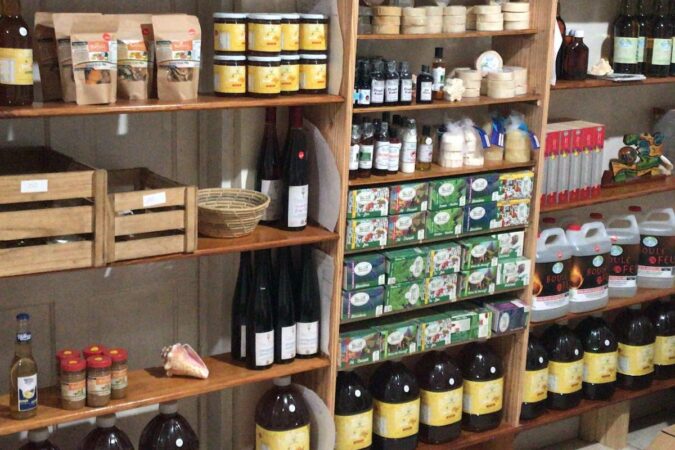 Organic store of the Beehive Manufacturing Workshop ©ViAHSA
Organic store of the Beehive Manufacturing Workshop ©ViAHSA
Eight types of mead, medicinal rums made from plants such as Moringa, Roselle (Sorrel), Quenêpe (Spanish lime), Vetiver, Gros thym… grown on the Dubourg bee farm in Limonade are also produced.
Moreover, the company markets products from the hive such as beeswax, propolis, modern hives, and all the beekeeping equipment necessary to practice the profession which it sells on the local market.
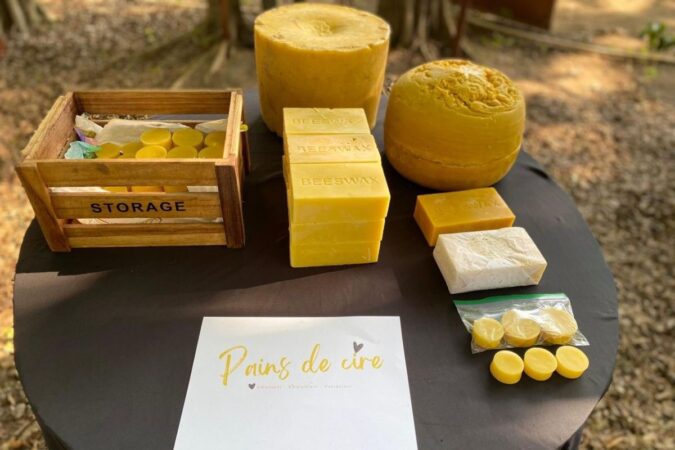
Beeswax bars. ©ViAHSA
The use of traditional tools – such as traditional or semi-modern beehives, tree trunks and drums – represents a challenge for production.
This is still the case in the South of the country where the sector remains underexploited.
“Beekeeping is done in the traditional way and people harvest a gallon of honey per year,” observes Renaud Joseph, executive director of MiPaS.
Addressing these challenges requires “the training of a new cohort of beekeepers,” ViAHSA director Ascencio Paul told AyiboPost.
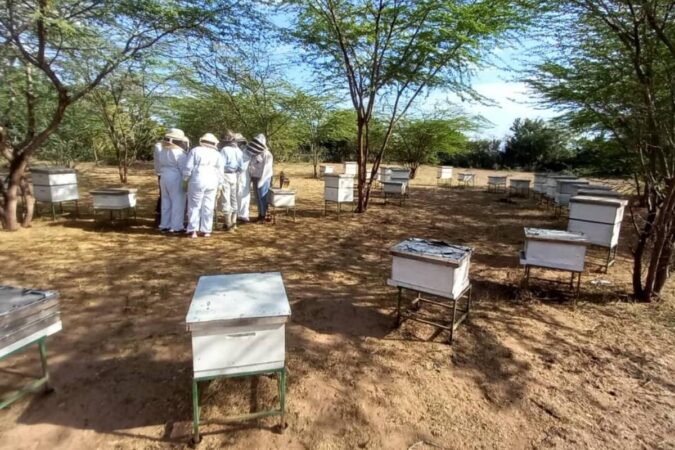
Workshop on modern beekeeping techniques at ViAHSA’s Centre de Formation Permanente en Apiculture (CFPA). ©ViAHSA
Beekeeping is done in the traditional way and people harvest a gallon of honey per year
-Renaud Joseph.

A ViAHSA store with a wide range of beekeeping equipment. ©ViAHSA
To this end, his company has had, since January 2021, a Center for Continuing Education in Apiculture (CFPA) which popularizes good beekeeping practices and helps beekeepers produce quality honey.
“We instill in beekeepers that their primary role is to preserve the environment and protect the bees,” says Paul.
Over the last four years, the CFPA has trained more than 500 beekeepers in various regions of the country: Irois, Jérémie, Cayes, Aquin, Ouest, Plateau Central, Artibonite, Nord-Est, etc.
For now, the company produces mead for a local market and is aiming for 2030 to formally export its products.
ViAHSA used to supply honey to supermarkets in the West department.
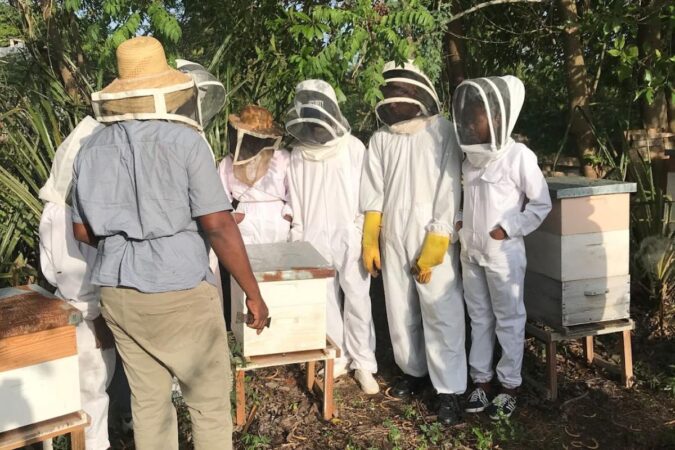
Workshop on modern beekeeping techniques at ViAHSA’s Centre de Formation Permanente en Apiculture (CFPA). ©ViAHSA
But since 2021, the company can no longer sell its products because of road blockages due to insecurity.
“We have a stock of products worth $45,000 that cannot be distributed,” says the owner of this corporation with 14 employees.
“We survive and work to pay salaries,” he adds.
This corporation of a dozen shareholders, including Micro Parc Apicole Sud (MiPaS), Vétérimed and the Jardin Botanique des Cayes, operates on two active beekeeping farms, including one in Limonade.
The company’s 40-hive apiary produces an average of 140 gallons of honey a year,” explains Saintil Locean, technical manager of the ViAHSA apiary in Limonade.
Without processing, a gallon sells for 7,500 gourdes compared to 12,500 gourdes after processing and packaging, continues the technician who makes routine visits to around 40 ViAHSA hives.

Beehive manufacturing workshop ©ViAHSA
According to data from 2010 from the Ministry of Agriculture (MARNDR), approximately 8,500 rural families practice beekeeping in Haiti. And, one of the regions where this sector is most developed is the North-East.
The Ouanaminthe Beekeeping Cooperative (CAO) founded in 1961 was a leader in the sector.
In 1980, it marketed honey in Europe and America, but lost the international market after a quality control incident, collapsing in the 2000s, according to the aforementioned OXFAM study.
In 2022, the Food and Agriculture Organization of the United Nations (FAO) estimated national production at approximately 1,000 tons annually.

Christophia honey in 1,050 g flute, jars, and bottles of 600 g, 500 g, 460 g and 300 g. ©ViAHSA
The absence of national structures, agricultural credit and research, as well as deforestation and the presence of the Varroa destructor parasitic mite, which attacks bees, are hampering the development of the beekeeping sector in Haiti.
Cover image | A participant counting the number of bees on a fram. May 20, 2024 for the 7th World Day of Bees and Other Pollinators. ©ViAHSA
This article was updated on 8/12/2024 at 1:50 PM.
► AyiboPost is dedicated to providing accurate information. If you notice any mistake or error, please inform us at the following address : hey@ayibopost.com
Keep in touch with AyiboPost via:
► Our Channel Telegram : Click here
► Our Channel WhatsApp : Click here
► Our Community WhatsApp : Click here







Comments